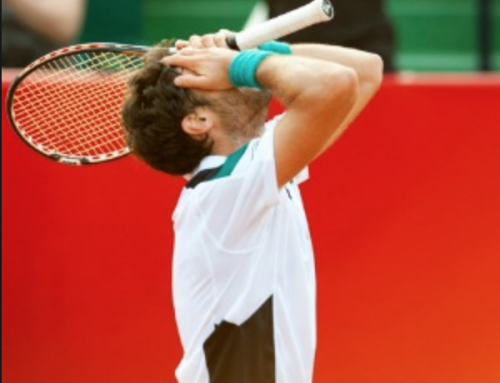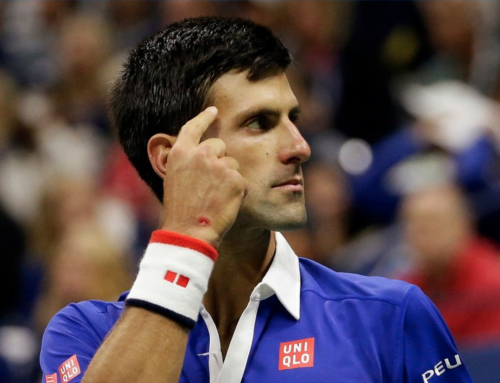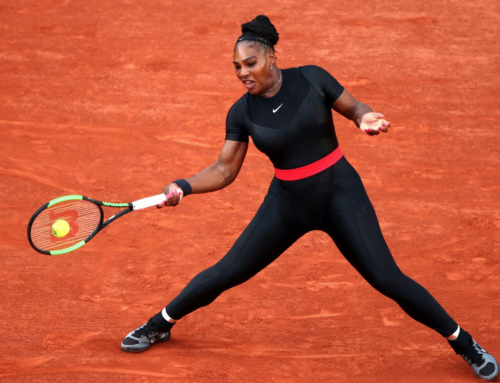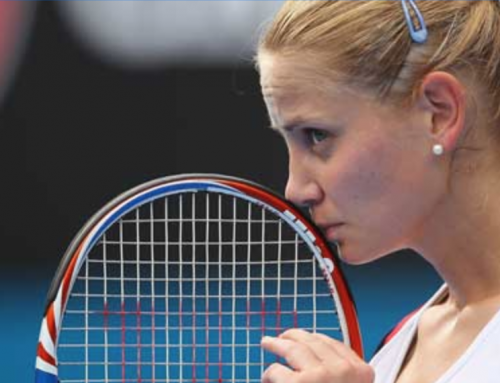It’s widely accepted that keeping a totally neutral exterior during tennis matches is the way to go when it comes to mental tennis, but in today’s show I’m going to give you a few reasons why that might not be the case! Sure, we can all come up with a list of past champions that never batted an eye regardless of the situation or how frustrating things might be for them, but at the end of the day that just isn’t realistic or even best in terms of performance for all of us. Find out when it’s ok to let off a little steam, and what ways are best to do it!
Download Transcript: Word Doc | PDF | Kindle | Text
Welcome to the Essential Tennis podcast. If you love tennis and want to improve your game, this podcast is for you. Whether it’s technique, strategy, equipment, or the mental game, tennis professional Ian Westermann is here to make you a better player. And now, here’s Ian.
Ian Westermann: Hi and welcome to the Essential Tennis podcast, your place for free expert’s tennis instruction that can truly help you improve your game. Today’s episode of the podcast is brought to you by Tennis Express. Please check them out this week by going to EssentialTennis.com/Express.
Thanks for joining me on today’s episode of the podcast. Really good topic to talk about today all about keeping your emotions in check and whether or not it’s necessary to keep a poker face. And before that, I just want to let you all know that I’m going to be in Cincinnati this week. I’m recording this on August 8th, Monday, and I will be in Cincinnati for the ATP/WTA tour events starting on the 14th, that’s Sunday, and I think through the 18th which is Thursday. And I’m going to be filming the pros as they’re on the practice courts. I can’t wait to do that. I’m really pumped for that. I’m going to start putting out a whole bunch of really high quality slow motion videos, kind of like what Fuzzy Yellow Balls has been doing.
So if you’re going to be there for the tournament, let me know. I’m looking forward to meeting up with as many of you as I can that listen to the show on a regular basis. Just shoot me an email to ian@essentialtennis.com. Okay, with that let’s get down to business. Sit back, relax, and get ready for some great tennis instruction.
Today’s question comes to us from Megan in New Zealand. She’s a 4.0 player, and she wrote to me and said a couple of questions, but we’re only going to be covering this one today because I think it’s an important enough of a topic that I just want to do just a standalone show just on this topic. I want to make sure that I have time to get to everything that I want to talk about having to do with it, and I’m going to save your other two questions for a different show.
So here’s the poker face question from Megan. I’m the type of player who was constantly hassled for being a perfection, and often because of this I’m thought to be quite negative and critical. I struggle to keep a poker face when I play, and I’m just wondering about the whole idea of the poker face. Is it okay to get upset with yourself when you make silly errors and just not show that frustration on your face? Or are you just not supposed to get mad at all because that seems near impossible for me to achieve.
Megan, really good question. This is the type of topic that you’re not going to see a whole lot of information about out there. So I’m really happy to talk about this, and especially because I think it’s a real important topic for recreational players and anybody who takes it seriously, which I know you definitely take it much more seriously than your average typical recreational player, otherwise you wouldn’t be taking the time to listen to a podcast to try to get advice.
And this is a topic that I personally have struggled with a lot, and I’ve talked about it very openly throughout many shows as I’ve been doing the Essential Tennis podcast. I have the same kind of issue Megan. I have a perfectionist type mentality and personality when it comes to tennis. I’ve always taken it very seriously and almost to a fault. I guess that’s the first thing I want to talk about just for a brief second because I’ve talked about it before.
Be careful about over-doing it. And you really can overdo it. I know that for me personally I did overdo back when I was in college. I was way too hard on myself. Listen it’s good to have high expectations and good to have lofty goals because that’s when you’re going to work the hardest, and you’re really going to expect the most out of yourself. And that’s good, but when you expect so much out of yourself that every time you make a mistake you get upset, then we have problems because that is just not realistic. You will make mistakes, and you will make, as you said in your question, silly errors. It’s going to happen pretty much every match, several times per match.
So I just want to start out by reminding you to please be realistic about it and be willing to cut yourself a break because when you watch the pros on TV, they make mistakes. There’s that whole category in the stats called unforced errors. That means they just screwed up for no fault other than their own.
So if that’s a whole category in the stats for the pros, you better believe it’s a category for us as well. Those of us who play recreationally. So there, that’s my speech. So don’t be too hard on yourself. I just want to start off by saying that.
Now the poker face. Is it okay to get upset at yourself? The best answer I have to that is it can be. It depends on your personality and how you perform during different emotional states. I’m going to split up today’s discussion about this into three basic options that you have when it comes to handling adversity. And let me again just start off by saying you will have to handle adversity out there. Once in a while you’re going to play that match where you’re having a really good day and you feel comfortable. The opponent that you’re playing is not much of a challenge. Or maybe they are close to your level but you’re just on that day. That’s going to happen sometimes.
The rest of the time that you play tennis, probably the other 90% of the time, you need to be prepared to handle adversity at some form or fashion. It could be your own technical mistakes. That could be an annoyance or your surroundings. It could be an annoyance that your opponent is presenting to you. They could be cheating. It could be any number of things. And when that happens, no matter what the adversity is, there’s three main options. The first option is keep it all inside. Keep that just flat even poker face no matter how frustrating. No matter how upset you get or want to get, you just keep that poker face. And there’s a couple of players that are more or less famous for this. Federer didn’t used to be, but for the last 10 years he’s been really good at staying even keel. You’ll very rarely see him get frustrated or upset. Sampras probably very even. Almost depending on who you ask to a fault. Not really to a fault in terms of his performance. This was clearly his personality. When you see him off the court, he’s very even. Very flat. A lot of people would describe him as boring both on and off the court.
I’m going to list some pros and cons here to keeping it all inside. Pros, you don’t encourage your opponent, and this is really a big one. When you showed no outward frustrations, whether it be facial expressions or gestures or verbal outbursts or throwing your racket, when you don’t do any of that you don’t give your opponent anything to go on. You’re not giving them hope by showing them that whatever they’re doing is working, right? I mean, if what they’re doing is working and you get upset and discouraged, that will give them motivation.
And so probably the biggest pro to acting like this emotionally is that you don’t give them that satisfaction. You don’t give them that emotional benefit of showing them that what they’re doing is in fact working against you.
The second big pro to this is it helps keep you level headed emotionally, and that means that you’re going to avoid spiraling out of control and getting really upset and negative at yourself. When you purposefully practice and try to discipline yourself to be as level headed as possible, then over time you learn how to — it’s kind of a discipline, and you discipline yourself into being more focused, keeping your concentration, and you don’t fly in and out of different emotional states, which can really disrupt your ability to perform and disrupt your ability to compete as best as possible. Those are really the two biggest benefits. You don’t encourage your opponent, and you keep yourself level headed by purposefully trying to be this way and having the discipline to maintain an even poker face.
Now there are some cons. Somebody with a lot of natural emotional passion can really feel smothered by this and feel inhibited and really feel bottled up. And somebody — and we could have discussions back and forth about how much of this is natural and not really something we can change about ourselves, and how much of this, I use the word discipline. Can you really kind of change your natural personality? Some of us are naturally very even, very cool, very calm. Nothing really gets us riled up. And others of us are just naturally very outgoing, exuberant. We react emotionally very strongly one way or another. We’ll swing back and forth. It might be positive emotion and really negative emotion, but some of us tend to be more outgoing when it comes to that. And somebody who is naturally more outgoing and more emotionally passionate, this might not work well because they will feel very bottled up and basically swallowing it over and over again during a tennis match when there is adversity and you’re having disappointments maybe again and again during a match. It can take somebody like that and really take their attitude really negative. When they try to just swallow it down and just ignore it, it can really backfire and really just cause a bad negative attitude.
Now in general to keep it all inside method, in my opinion, this is the best option possible. I mean, there’s really not any denying the results. If you look back over the history of tennis, the players who have been standouts as most successful and most dominant have tended to have this outlook or this personality to stay even emotionally. Not all of them. There have been some that are the opposite of this, but I would argue that for the most part, professionals have tended to control their emotions very well. So that’s the keep it all inside method.
The second is the let it all out method. No matter what you’re feeling, just it all hang out there. Some professional examples of that would be Safin, McEnroe, John McEnroe, and Jimmy Conners were all players that were well known for just letting their emotions just come out. As a result, they could be very entertaining to watch, or they might’ve been very annoying to watch. Some people don’t appreciate that.
There are pros and cons to this. I have one pro, just letting it all go can be good for some people. Now the con is again you’re just letting it all go. it’s kind of a double edged sword. Sometimes this can really backfire. If you just allow yourself to just let it all come out, sometimes that can backfire. And for some of the reasons that we talked about before, it can really give your opponent hope and motivation. It can cause you to lose your focus and lose your concentration, and it can kind of spiral and compound on top of itself in terms of having a negative attitude. And it sometimes it can get out of control and self-perpetuate. And before you know it you’re in a terrible mood and you have a terrible attitude because you’ve allowed yourself the ability to be able to have these outward outbursts. Now, this can work for some people, but in my experience it’s very few. I’m not giving my seal approval because for most people you do need at least some restraint in there otherwise you just kind of self-destruct. And I don’t want that to happen.
The third is basically a hybrid. You kind of let it all here and there. You have a small outburst, but for the most part you stay level headed. And that’s basically your goal to stay level headed unless you kind of get a build up inside where you need to kind of release and let the pressure valve release some steam. To be honest, this is how most players are. Very few people have the discipline to not let anything out during a match and show frustration. By letting it out, it can take several different forms. It might be an angry yell like a verbal outburst. It might be a verbal reprimand to yourself. You see pros do this all the time when they talk to themselves. They get frustrated and self-coach themselves a bit. That brings to my third example, just laughing and shaking your head. Just shrugging it off. Wow that was a dumb mistake. What was I thinking there? And you literally laugh it off. And that could in the form of a reprimand as well. Those are all different ways of having a pressure release and allow yourself the chance to emotionally vent a little bit.
And then your goal should be to go right back to being as even as possible and maintain that as long as possible. Maybe when you have a good way, you’re able to stay even throughout the entire match. But other days, maybe really being challenged by a certain player or by just a certain day. And so here and there, you need to let a little bit of emotion out. I think for a lot of people, that’s certainly fine as long as you remember that it’s your goal to reign yourself back in again.
Now I’ve got pros and cons for this type of overall strategy, the hybrid. The pros are you have a goal of being levelheaded, but you have a release valve. You can let some frustration out, and then refocus. It’s basically what I described.
The cons are, if you can’t keep ontop of it, then releasing those emotions can self-perpetuate. Like with the let it all out method, before you know it you can be spiraling out of control. If you allow yourself to have that out and then 30 seconds later you have an outburst again. And before you know it, you’re just negative, negative, negative for the rest of the match. And again, that just makes it so difficult to compete for most people.
And also under cons, giving those emotional outbursts gives a boost to your opponent. There’s no getting away from that. Ultimately this is why I mentioned that keeping it inside method I personally think is still the best, but it’s still not realistic for everybody. Some of us can still perform well when we have outbursts, and I’m going to talk about that. But when you have that outburst even when you personally perform better when you have an outburst here and there, you’re still giving that boost to your opponent. You’re still letting them know that you are getting frustrated.
If you can avoid giving your opponents that emotional boost, then you should. This is leading into my conclusion now. As far as the poker face is concerned, in conclusion if it all possible keep yourself even and steady 100%. I mean, I really think this is the best but in reality it’s not always possible for everybody. And I know this from personal experience. I tried, and it’s interesting. Everybody is different. In person I’m very, very even. It’s very difficult to get me upset. I almost never get emotionally upset at other people. I’m very even and quiet, but on the court it really brings out the competitiveness in me. It really brings out my perfectionistic nature, so when I’m competing it’s very difficult for me to maintain a levelhead and maintain kind of neutrality in terms of my emotions when things are happening that I don’t like.
When I keep everything in and continue to have adversity, my mood just sours and I get more and more negative. And I have — I’ve gone through matches where I successfully kept it all inside, but I just get somber. And my mood just gets worse and worse. I don’t overtly show it to my opponent, but without some kind of release emotionally, I just get more and more internally negative. So I found that for myself if I don’t have some kind of release, I don’t play at my best performance. Usually for me it’s laughing it off and immediately I refocus. For me right now, that’s the best balance for myself. Keeping it all inside doesn’t work. On the other hand, letting it all out doesn’t work for me either. I self-destruct.
So Megan, which one of these that will work for you, I’m not sure. My best advice to you is to stay as level as possible and experiment. The bottom line is we’re looking for the best emotional state in which you are the most focused and in which you are able to keep your concentration the best and in which you ultimately perform the best. I mean, that’s always the bottom line, right? We’re trying to improve, and you need to be very aware of what your emotions are like. Very aware of how you’re allowing yourself to have a release here and there if that’s what works for you. It might be any of these three. The only way to figure this out is through experience. Get out there and play matches. Try different methods. Honestly, you should pick the one that is the least destructive as possible emotionally. I personally love the laughing it off method. Give yourself a bit of release there and joke with yourself. I think that’s a great way to deal with it and handle. And then go right back to being focused and even and ready for that next point. And maintain that as long as you can.
Bottom line, I really do believe that you should try to stay even as best as possible. But I’m not going to say that everybody can do that. I know from experience that’s not possible, and it’s not how everybody performs the best. So Megan, hopefully that makes sense. Thank you so much for your great question. And I’ll get to your second and third question in a future podcast. Can’t say for sure which one that will be, but I will get to it. Thank you for being a listener in New Zealand. If you have any other further questions on this, please post them at essentialtennis.com/podcast. This will be episode #182. Megan, thanks again and best of luck as you continue to find your best way to compete emotionally.
Alright, that does it for episode #182 of the Essential Tennis podcast. Again if you’re going to be at Cincinnati during the ATP tournaments, let me know. And in wrapping up today’s episode, I’d like to read 2 different comments from last week’s show. First from Roger. Ian, I played last night with one of my weekly regulars whom I always beat, but that wasn’t the case this time. I took him for granted and went in with the attitude I’m going to win this easily as usually. I had him up for 4-1, and then things started to turn around for my opponent, and I got beat 4-6. I’m typically the stronger player and in the back of my mind I wasn’t respecting his abilities. Then I thought about your podcast. Keep up the awesome podcasts. This is an eye opener, and I’m not going to disrespect anyone on the court again.
Alright Roger. I hope so. That was a big point that I made in last week’s show. There’s not only the technique element of beating somebody, but there’s the mental and emotional side of it as well. Way too often we go out on the court against somebody who we don’t respect. We don’t perceive them as being as good as us, and we take it for granted and get lazy. Before we know it, we’ve lost the match. Great to hear that show was helpful for you.
Then also from Gavin S. In the podcast you mentioned the technique for finishing short balls. Any technique suggestions on doing this? I find that if I hammer the ball, it goes long, but if I hit a lot of topspin, I don’t hit quite enough through the court when I approach the net which leaves me exposed. Yeah, Gavin, you definitely want to balance those two things out. You want to have enough pace on the ball that it travels through the court quickly, and you’re able to keep your opponent on the defensive. But on the other hand, if you don’t hit with any topspin and you as you put it just hammer it, then it’s going to be very low percentage and very difficult to keep in play. So you definitely want a good balance between the drive and the spin of the shot. If you go check out episode #98 of the Essential Tennis podcast, it focuses completely on how to handle this shot and the technique of dealing with short shots.
So Roger and Gavin, thank you both for leaving your comments. A bunch of other people did as well. Thank you to everybody that left comments for last week’s show, and if you have any comments or questions about this week’s show, please leave them at EssentialTennis.com/Podcast. Until next week, take care and good luck with your tennis.







